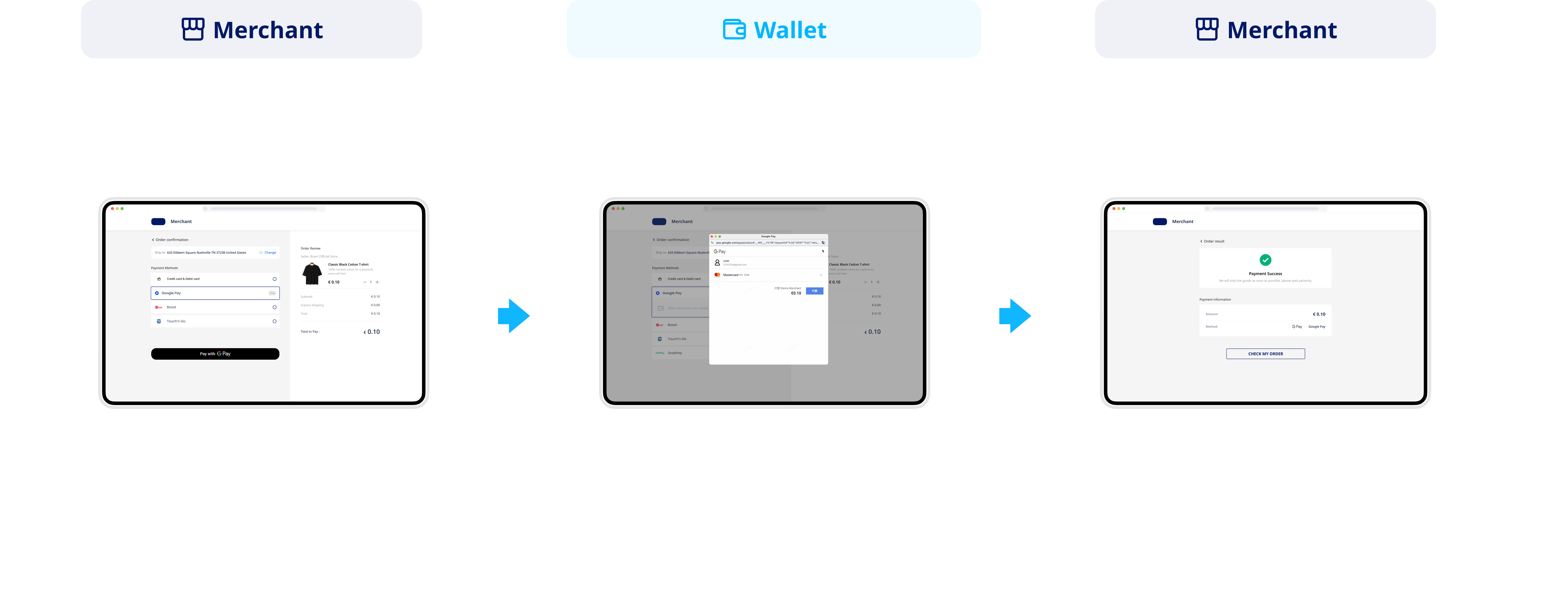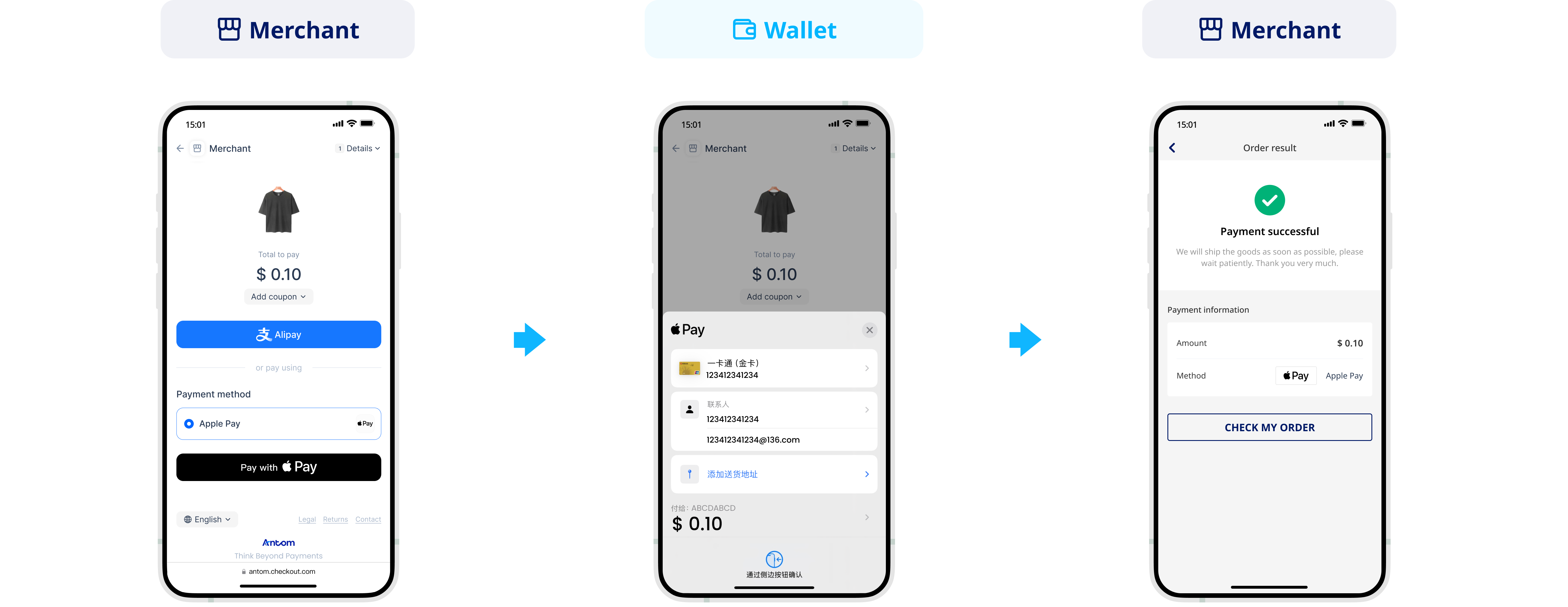Accept payments with Google Pay
Through the Google Pay service, buyers can make payments using credit or debit cards stored in their Google accounts. With Antom Checkout Page (CKP), you do not need to integrate the Google Pay SDK separately. Checkout Page will automatically load Google Pay services for you and can be configured to support Google Pay as an express payment method.
User experience
Integration preparations
Before you start integrating, read the Integration Guide and API Overview documents to understand the integration steps of the server-side API and the precautions for calling the API. Furthermore, ensure that the following prerequisites are met:
- Obtain a client ID
- Complete the key configuration
- Complete the configuration of paymentNotifyUrl to receive the asynchronous notification
- Integrate the server-side SDK package, install the server-side library, and initialize a request instance. For more details, refer to Server-side SDKs.
Integration steps
Follow these steps to start the integration:
- Create a payment session
- Redirect to Antom Checkout Page
- Obtain the payment result
- Initiate capture
Step 1: Create a payment session
Follow Step 1: Create a payment session to call the createPaymentSession (One-time Payments) API and pass in the order information to create a payment session and redirect to the Antom Checkout Page. At the same time, you need to pass in the following parameters:
Parameter type | Parameter name | Required | Description |
Order parameters | order.buyer | Yes | The buyer information of the merchant side. At least one of the following information must be provided:
|
Google Pay parameters | availablePaymentMethod.paymentMethodMetaData.googlePayConfiguration | No | In the Checkout Page scenario, it is recommended to use the default value for this parameter.
|
| Specify Google Pay as an express payment method | availablePaymentMethod.paymentMethodTypeList.expressCheckout | No | You can specify Google Pay as an express payment method either by setting this parameter to |
The following shows the sample code of a request:
{
"order": {
"buyer": {
"referenceBuyerId": "yourBuyerId"
},
"goods": [
{
"goodsBrand": "Antom Brand",
"goodsCategory": "outdoor goods/bag",
"goodsImageUrl": "https://mdn.alipayobjects.com/portal_pdqp4x/afts/file/A*H8M9RrxlArAAAAAAAAAAAAAAAQAAAQ",
"goodsName": "Classic Woman Bag",
"goodsQuantity": "1",
"goodsSkuName": "Black",
"goodsUnitAmount": {
"currency": "SGD",
"value": "6000"
},
"goodsUrl": "https://yourGoodsUrl",
"referenceGoodsId": "yourGoodsId"
}
],
"orderAmount": {
"currency": "SGD",
"value": "6000"
},
"orderDescription": "antom ckp testing order",
"referenceOrderId": "c3df9b82-ff67-424b-880b-06c3615b46ea"
},
"paymentAmount": {
"currency": "SGD",
"value": "6000"
},
"availablePaymentMethod": {
"paymentMethodTypeList": [
{
"paymentMethodType": "GOOGLEPAY",
"expressCheckout": false,
"paymentMethodOrder": 1
}
]
},
"paymentNotifyUrl": "http://www.yourNotifyUrl.com/payment/receiveNotify",
"paymentRedirectUrl": "http://localhost:8080/index.html?paymentRequestId=597795b7-c812-4132-bd7d-c55914eefdcb",
"paymentRequestId": "597795b7-c812-4132-bd7d-c55914eefdcb",
"productCode": "CASHIER_PAYMENT",
"productScene": "CHECKOUT_PAYMENT"
}Step 2: Redirect to Antom Checkout Page
After the merchant server obtains normalUrl and passes it to front end, it will redirect from the merchant front end to the Antom Checkout Page. For details, please refer to Step 2: Redirect to Antom Checkout Page.
Step 3: Obtain the payment result
After the buyer completes payment or the payment times out, you can obtain the payment result either by receiving asynchronous notifications from Antom or by proactively querying the result. For detailed steps, refer to Process asynchronous notifications and Inquire paymnets.
Step 4: Capture
If payment is successful, Antom will automatically initiate capture for you, while you can also initiate capture manually. After capture, you can obtain the capture result either via asynchronous notification or active query. You should decide whether to ship goods based on the capture result. For specific operations, refer to Capture.
After payments
After completing the payment, you can perform the following actions:
Refund
To learn about Antom refund rules and how to initiate a refund for a successful transaction, see Refund for more information.
Dispute
When a buyer chooses to pay with a card, a dispute may occur. To learn more, see Dispute.
Reconciliation
After the transaction is completed, use the financial reports provided by Antom for reconciliation. For more information on how to reconcile and the settlement rules of Antom, please refer to Reconciliation.
Additional content
Card payment features
Card payment features also apply to Google Pay. The following table outlines the support status of these features for Google Pay:
Type | Supported | Conditions |
Conditional |
| |
| Yes | None | |
| 3D Secure 2 | Yes |
|
| Antom 3DS-Retry | Yes | None |
| MIT | Yes | None |
| Installment payments | No | None |
Specify a payment method
You can specify payment methods on Antom Dashboard through Payments > Checkout page > Payment methods. You can also pass the parameters in the createPaymentSession (One-time Payments) API to specify the display of payment methods on Checkout Page, the order of the payment method list, and the display of express payments.
Note: If you pass parameters through the API, the API values take priority.
This feature offers you the following benefits:
- Filter local payment methods based on your business region.
- Sort your preferred payment methods.
- Display the mainstream quick payments, such as Alipay, Apple Pay, and Google Pay.
To specify Google Pay as the only payment method, pass the following parameters in the availablePaymentMethod parameter of the createPaymentSession (One-time Payments) API:
The following is a sample code for specifying Google Pay as the only payment method:
{
"availablePaymentMethod": {
"paymentMethodTypeList": [
{
"paymentMethodType": "GOOGLEPAY",
"expressCheckout": true,
"paymentMethodOrder": "0"
}
]
}
}

